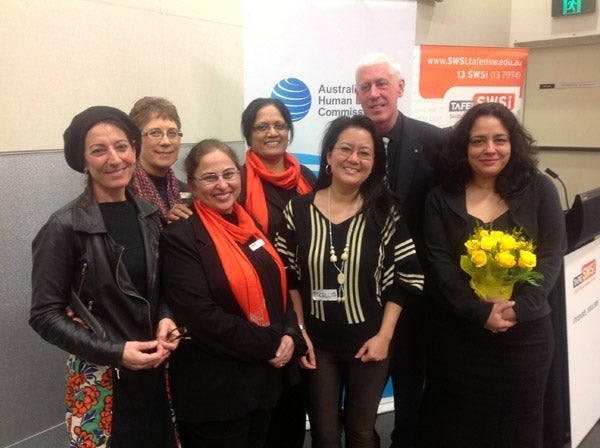Launch of the Human rights education project with Granville TAFE

Friday 14 June 2013, Granville College
I too acknowledge the traditional owners of the land we meet on, the peoples of the Darug nation, and pay my respects to elders, past and present. Thank you also Uncle Des for your Welcome to Country.
Thank you Paula for that presentation on the Certificate IV in Human Rights Education and Advocacy .
The project we are launching today is a partnership between the Australian Human Rights Commission and Granville College, South Western Sydney Institute.
It has been made possible through the commitment and perseverance of Philomena Carneiro and Amrit Versha, (from Granville College). They came to us with great ideas about how to ensure that the unique course developed by Paula, and piloted with the Commission in 2012, could be made available to hundreds of workers and teachers. We recognise them, and Maria Katsabanis at the Commission.
This partnership will ensure that the resources and strategies that make human rights education, knowledge and skills accessible are available to learners, service and pre-service workers everywhere, everyday.
Some of you may be wondering why the Commission is involved in TAFE. In fact, this is only one (albeit a very important one!) of a number of projects the Commission is engaged in that seek to integrate human rights education, content and resources in the Australian school curriculum and the vocational education sectors.
The Commission has a mandate to undertake educational programs that promote human rights, and to assist in the formulation of programmes for the teaching of, and research into, human rights, and to take part in their execution in schools, universities and professional circles: this doesn't mean human rights education is limited to what human rights lawyers do. It’s not all about us.
Nobody questions that knowledge of discrimination law and human rights are necessary to protect the rights of all people - we've seen that in the 20 Years: 20 Stories we have screened here today.
But, it is just as important that we understand that human rights is also about ensuring that all people, including marginalised, vulnerable people, are treated with dignity, respect and that our assumptions about their needs do not drown out their voices.
In the words of one of the graduates from the Cert IV course:
Human rights are more than the principles in a book. It's about how we embody these principles. About our own behaviours, how we treat other people, how organisations empower individuals, to treat people with dignity, equity, with fairness and with transparency.
We want to continue this important work. We want to do it by ensuring human rights education is systemically embedded in mainstream education. Developing and piloting this skillset with Granville College, TAFE, means we will engage workers, pre-service workers and learners enrolled in Aged Care services, Disability services, Refugee services, Home and Community Care, and general community development - 'frontline human rights workers.'
Most of you are here because you are committed to, and interested in, finding out more about human rights. Some of you are here wondering how this skill set will benefit your industry. We say, as an industry, you can only benefit from workers who are trained in, and understand the importance of, how to maintain rights-based legal and ethical work practices, and use this knowledge to critically reflect on, and maintain legal and ethical workplaces.
For students and workers, wondering how they can benefit from this project, here are some quotes from graduates of the Cert IV in Human Rights Education and Advocacy:
My view of human rights has changed. I used to see it as a package of rights you fought for, on behalf of others...but really, at the same time, it's also about how you treat other people.
We have reflected on what human rights education means in practice, for us as workers, and how we can use our knowledge and skills to become more effective, and how we can develop human rights culture in our groups, organisations, workplaces and in the broader community sector.
To prevent myself from being the typical person who thinks they are 'helping' [vulnerable people], while really disempowering them or creating an unsafe space.
Without human rights education, the most marginalised and vulnerable can neither access, nor realise, their rights. Without human rights education, human rights principles remain abstract.
The project we are launching today makes an important contribution to these objectives. With this project, we want to make sure that the transformative potential of human rights education is realised.
I am very proud to have had a small involvement, and to launch this project. A really practical, powerful example of community activism.
